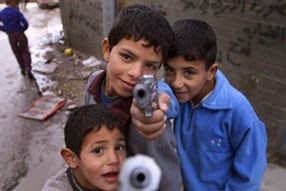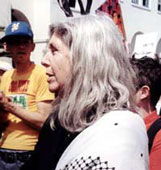



Terror of war turns child play dangerous
by Cheryl
Bowlan and Donna Hemmila
 |
| Boys aim toy guns as they play in the Dheisheh refugee camp, Dec. 26, 2000. (AP photo) |
Barbara Lubin talks about working with children in the Middle East. |
Barbara Lubin has been visiting the Palestinian territories for more
than a decade, so she's used to the military checkpoints that dot the
roads leading in and out of refugee camps.
She knows the drill: a soldier stops the car, orders the occupants out
onto the side of the road, checks identification and searches them and
their vehicle. Sometimes the searching can take hours as the soldier orders
travelers to take out the seats of their car and unpack their bags. Such
military roadblocks have become a part of the daily routine in the territories.
But this checkpoint outside Deheisheh refugee camp seemed more ominous
than any Lubin had before experienced.
That's because the soldier who ordered her car to stop was not a member
of the Israeli occupation force, but a laughing Palestinian child. Armed
with a toy gun, the youngster had made a game out of stopping the car
and forcing the adults to get out, just as he had many times seen the
soldiers do.
The worst part was the child had purchased his toy gun with Lubin's money.
As director of the Berkeley-based Middle
East Children's Alliance for Peace, Lubin raises money to support
health care clinics and educational and sports activities for the Palestinian
refugees. On her visit in March 2002, the Jewish grandmother took $25,000
in donations to dispense. Most of the money went for badly needed food
and medical supplies in the Gaza Strip. Following an Islamic holy day
custom, she had given small gifts of money to the youngest children in
the camp to buy themselves a treat.
"The next day almost every kid had gone across the street to buy
fake guns, so every kid in Deheisheh had a fake Uzi, a toy Galishnakov,"
Lubin recalls. "They were playing Israelis and Palestinians fighting
each other, killing each other."
In the last 10 years, Lubin has seen the anger and frustration among
Palestinian children growing stronger. Children 10 and younger talk about
killing and suicide.
 |
|
Barbara Lubin, director of Middle East Children's Alliance, at San Francisco demonstration, April 20, 2002. (photo by Cheryl Bowlan) |
Lubin talks about suicide bombers. |
"They're sitting around talking about blowing themselves up and
being suicide bombers," Lubin says of the children she works with
in the camps. "They are furious."
A young Deheisheh woman sparked international outrage in April when she
strapped on a bomb and blew herself and two others up at a supermarket.
The daily humiliations of the occupation are driving young people to such
extremes, says Lubin. During a curfew, families with 10 and 12 children
are confined in two-room houses, often without electricity and water,
and unable to walk outside or even look out a window for fear of being
killed. They see their parents bullied and beaten by soldiers and the
rage builds, she says.
Manal Issa, an office manager at the Sakakini Cultural Centre in Ramallah,
has been collecting children's reactions to the latest Intifada such as
this account from 15-year-old Mizer Jibrin.
"They imprisoned my sisters, brothers and me in our small kitchen,"
says Mizer. "And sabotaged our home. They arrested my father and
beat him with the other men. Then they covered their heads by plastic
bags, taking them to unknown destination. I experienced the occupation
and I will never ever forget. I want to say stop your occupation, stop
your tyranny and stop your killing, stop…."
Those are the realities that drive young people to kill themselves in
suicide bombings, says Lubin, and those suicides become heroes to the
younger children.
"When they die immediately their pictures go up on all the walls,"
Lubin says. "They're very respected because they are people who fought
back."
MECA, the group Lubin founded, helps support the Ibdaa cultural center
in Deheisheh outside Bethlehem by funding a library, computer center,
basketball and table tennis teams and a folk dance troupe. About 11,00
people live in Deheisheh, she estimates, and half are under the age of
18. The organization also built a guest house in Deheisheh where international
peace activists stay and where someday the group hopes to have a restaurant
and a place for people to hold weddings and other celebrations.
 |
| Palestinian boys walk by garbage heaps piling up in Dheisheh when Israeli curfews cut off sanitary services, April 15, 2002. (AP photo) |
When she left the region at the end of March, Lubin saw Israeli snipers
on the roof of the cultural center with 60 children downstairs in the
auditorium trying to carry on their normal activities.
After returning home, she received word that soldiers had gone into the
center and destroyed the library and computers. Twice before, Lubin says,
the center has been destroyed and she has helped rebuild it. She'll do
the same now.
"It's unbelievable that Jewish people could do this to other people,"
says Lubin, who grew up in a conservative Jewish-American home.
Amir Segev-Sayag, a spokesman for the Israeli consulate in San Francisco, says Americans have to understand there is a war going on in Israel. While he has no knowledge of the Ibdaa destruction, he says, the region is a battle zone where such things do happen. Soldiers have found explosives in schools and mosques, so they have to search places like the cultural center to end the terrorist attacks. He blames the Palestinian Authority for what he calls a callused use of children to promote terrorism.
"The Israeli army has no intention, wish or will in harming such
places, but again it's a battle zone," says Segev-Sayag. "If
someone is shooting at you, you shoot back at them."
Palestinian children live in miserable conditions, he says, but Israeli
children also suffer.
"Israeli children don't have a regular life," he says. "You
can't ride a bus, go out for play without being afraid that you will lose
your life in a second. Whole families have vanished, and their crime was
only that they went out for something to eat."
Lubin has no doubt the Palestinians and Israelis could live in peace
if the occupation ended. MECA is raising money to open a kindergarten
in Beit Hunun in northern Gaza as an alternative to the well-funded schools
run by the militant Palestinian Hamas group that has taken credit for
many suicide bombings.
Palestinian children do talk of a future, says Lubin, but they talk about
getting the Israelis out of their homeland, of returning to their villages.
"They want to build a life," says Lubin. "They want this boot off their necks."
